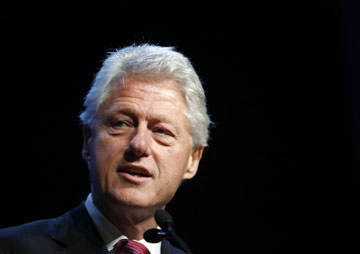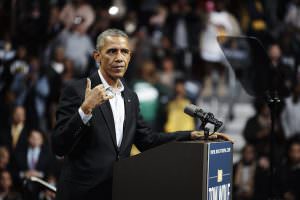Bill Clinton Urges Democrats to Embrace Health Care Reform
As the midterm elections approach, both public opinion data and the facts on the ground are taking a significant turn. stocklight / Shutterstock.com
stocklight / Shutterstock.com
Defending the Affordable Care Act in his memorable nominating speech at the 2012 Democratic National Convention, Bill Clinton did as he often advises his party’s elected officials: Don’t run away from the argument; confront it directly instead. During his own political career, the former president has done both.
“When the president asked me to speak for him in North Carolina, I said that I would do it — but that I could only do it and be effective if he let me explain and defend the health care deal,” Clinton recalled this week, speaking not only about the 2012 election but the midterm campaign now underway.
“I thought that Democrats had a tendency to shy away from things they had done that were unpopular, (and) talk about positions they had that were popular. And that my own experience had convinced me — going back to ’94 and even more when I was governor — that that was always a terrible mistake. That you had to turn in toward all controversies and embrace them — even if you said you were wrong or a mistake was made. You couldn’t not deal with it.”
That is the opposite of current conventional Washington wisdom, which insists that Obamacare’s unpopularity will cost Democrats control of the Senate as well as the House of Representatives. But the moment may have arrived when they will heed Clinton again — because both public opinion data and the facts on the ground are taking a significant turn.
Polling on Obamacare has often been murky or misinterpreted over the past four years, with voters who wanted a more radical reform counted as “opponents,” along with those who want no change. Most surveys have indicated as well that many Americans simply don’t understand how Obamacare benefits them and their families — and that many change their views when reform’s real impact is explained without propaganda. For optimists, at least, these data points always suggested that the tide of opinion would eventually turn.
The latest Kaiser Health Tracking Poll, released on March 26, offered evidence that this awaited shift is occurring, with well over half of respondents supporting the act, and less than a third urging its repeal. A strong majority of nearly 60 percent wants to keep the law as is or improve upon it, while only 29 percent want to repeal it altogether. Equally significant from the politicians’ perspective is that 53 percent say they are tired of listening to the debate — and that many aspects of the act, from insurance subsidies and regulations to Medicaid expansion and preventive care, are highly popular across party lines.
Major elements of Obamacare were popular all along, however, whether people understood its provisions or not. What revitalized the right-wing opposition to the law in recent months was a palpable sense that its implementation was failing — that like it or not, it wasn’t going to work. Embarrassing early operational failures and resistance from Republican governors and legislators made such prophecies of doom appear inevitable.
But suddenly, reform’s ruin no longer seems preordained. As the Obama administration and various experts predicted all along, the last several weeks of enrollment have seen a popular rush to sign up on the state and federal insurance exchanges. Days before the deadline of March 31, the White House announced that more than 6 million uninsured Americans had enrolled in qualified plans on the exchanges — more than the revised projections of the Congressional Budget Office.
By the end of the month, according to those tracking the numbers — notably Charles Gaba, the “numbers geek” whose ACASignups.net is well worth following — enrollment numbers will top 6.2 million.
Counting those who began to enroll before the deadline and will now have two additional weeks to finish, the final number should approach the administration’s original goal of 7 million. (Including every person who has signed up for private insurance or Medicaid, either within or outside the exchanges, Gaba estimates that ACA has encouraged at least 12.6 million Americans and possibly as many as 16.2 million to get covered — a major achievement.) And as people swarmed Healthcare.gov, they were signing up online without the infuriating glitch-and-crash epidemic that plagued the rollout last year.
What does this turnaround portend for November? Success for Obamacare might boost the turnout projections that Republicans have tried so hard to suppress and that Democrats have so far proved unable to resuscitate.
Dominant forces in the Republican Party — including the tea party and its billionaire financiers — have staked everything on the commonplace assumption that Obamacare will drag down Democrats across the country. Indeed, they make almost no other argument. Bolstering that cynical bet is the Democratic hesitation to mount a powerful counteroffensive on health care, with the impulse to push the minimum wage, unemployment benefits, and other vital issues that still feel safer.
But as Clinton warns, they will find no shelter from this storm. They cannot hide from their own history; and the more they pretend to do so, the more they risk contempt. For decades, Democrats have insisted that all Americans must have health coverage — a momentous and admirable goal advanced by the Affordable Care Act.
With the numbers now on their side, they should lift their heads, raise their voices, and lean into the midterm debate. They have no better choice.
© 2014 CREATORS.COM
Your support matters…Independent journalism is under threat and overshadowed by heavily funded mainstream media.
You can help level the playing field. Become a member.
Your tax-deductible contribution keeps us digging beneath the headlines to give you thought-provoking, investigative reporting and analysis that unearths what's really happening- without compromise.
Give today to support our courageous, independent journalists.





You need to be a supporter to comment.
There are currently no responses to this article.
Be the first to respond.